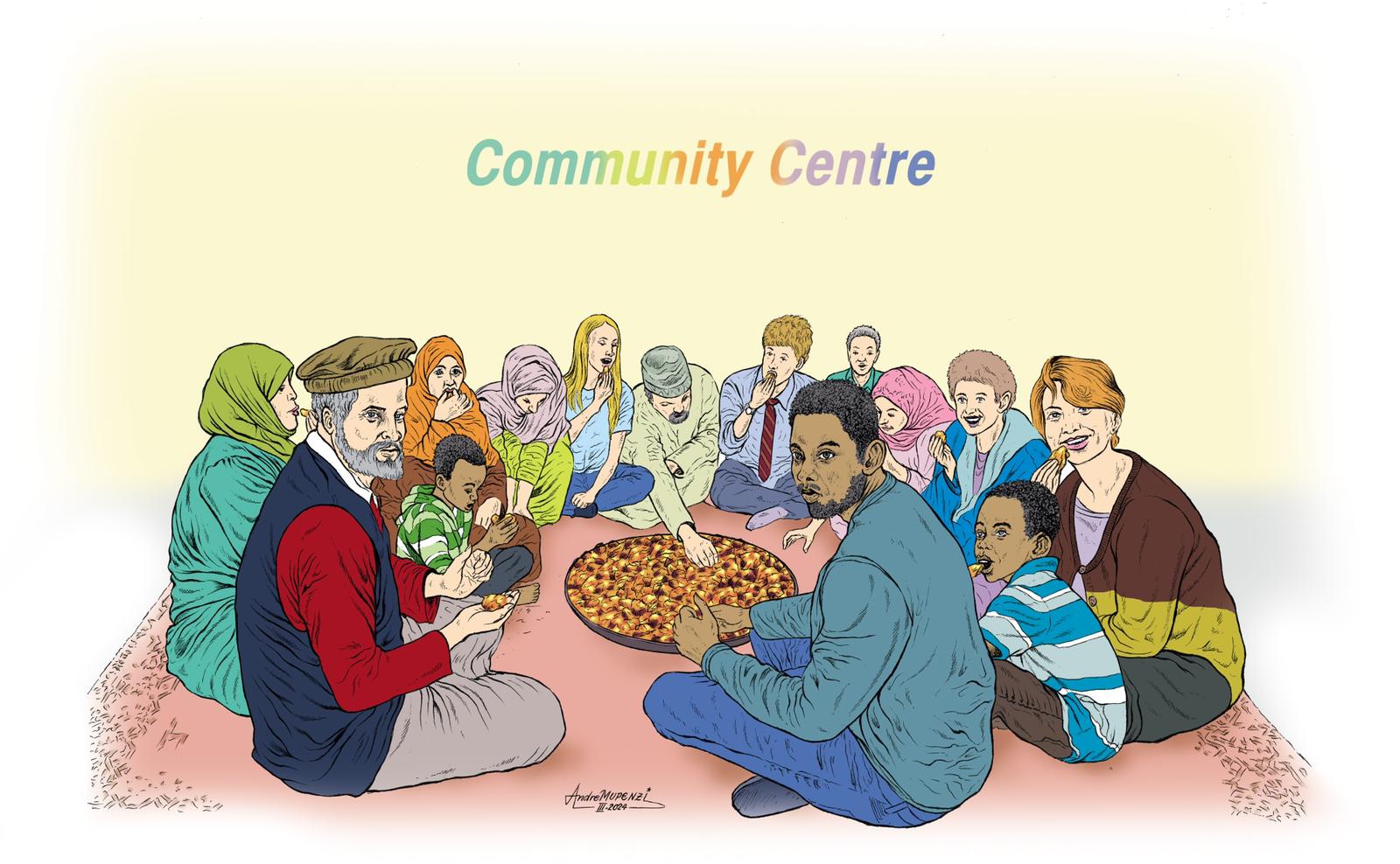Leveraging Privilege to Advance Equity and Inclusion: The Importance of White Allyship in Advancing Racial Equity in the Post-2020 Black Lives Matter Protests-Era
In this blog post, Fidele Mutwarasibo, Senior Lecturer and Director of the Centre for Voluntary Sector Leadership, shares insights into a paper on allyship he recently published. The paper reflects on his experience as an activist in the United Kingdom and Ireland and the lessons he has learned as a practitioner (scholar-practitioner) at The Open University, researching leadership and collaboration between service providers and racialised minority network leaders.

White allyship is a critical component in the fight for racial equity. This blog delves into the responsibilities and actions of White allies who support racialised minority communities in their quest for justice and racial equity. By examining the principles of effective allyship, including listening, learning, and leveraging privilege, the blog highlights the transformative impact that white allies can have. Through autoethnographic reflections, this blog aims to inspire and guide individuals committed to dismantling systemic racism and fostering a more inclusive society through emancipatory allyship. Understanding the role of white allyship is essential for creating lasting change and ensuring that the voices of racialised communities are heard and respected.
When I look back at my experience in Western Europe over the last three decades, I often wonder what my experience would have been without the support and encouragement I received from White allies. These allies, over time, became my surrogate family and fulfilled the role family members in East Africa could have fulfilled had I been living there. Lately, I have moved beyond looking at my experience as a person and focused on the role of White allies in promoting racial equity and non-discrimination. The issue came to the fore when I started asking myself questions about what needed to change to address in a more systemic way the disproportionate impact of the COVID-19 pandemic on racialised minorities in the UK in 2020, coupled with the 2020 Black Lives Matter Protests’ call for racial equity. In this autoethnographic (in Greek, autoethnography stands for autós = self + ethnos = people + graphia = writing) blog, I seek to analyse and describe (graphy) my personal experience (auto) to understand the culture around me (ethno) (Ellis, 2004) about White allyship in my research and social practices focusing on the last five years. This blog is an overview of the paper titled Beyond Open Doors and Performative Allyship: A Subaltern Autoethnographic Account on ‘White’ Allyship in the Post-2020 BLM Protests Era (journalspress.com) published a few months ago (Mutwarasibo, 2024) This work builds on a previous paper on racialised minority gatekeepers (Mutwarasibo, 2023) exploring the behaviours and leadership practices of gatekeepers engaging and collaborating with service providers.
In the paper, I discuss a typology of allyship, including:
- Vacuous allyship - underpinned by platitude but lacking real action (Hoque & Noon, 2004).
- Performative allyship - people positioning as partners in the cause without being prepared to commit to the challenging work required for societal change (Erskine & Bilimora 2019; Thorne 2022, p.1).
- Symbolic allyship - symbolic allyship gestures are deployed; these gestures are often short-term and limited in substance (Myeza & April 2021).
- Authentic and Substantive Allyship - involves allies’ continual and ongoing self‐learning (Thorne 2022, p.1)
- Emancipatory allyship - seeks to actively address systemic inequalities (Sumerau et al. 2021; Erskine & Bilimoria 2019).
Although the forms and manifestations of allyship were identified in the literature, many researchers have focused on performative and substantive allyships. Such an approach has meant less emphasis on vacuous and symbolic allyships, often covered under the umbrella of performative allyship. On the other hand, emancipatory allyship is mainly featured in substantive allyship literature and not given the attention it deserves. The allyship paper (Mutwarasibo, 2024) unpacks the manifestations of White allyship. It underscores the importance of emancipatory allyship in promoting racial equity and bringing about structural changes necessary to ensure that racialised minorities have a seat at the table where the planning, execution, and evaluation of inclusion and belongingness programmes happens.
The motivation for the research and the paper stems from the frustrations I have had in my research and social and political practices where I have witnessed tokenism coupled with service providers reaching out to ladder-pulling racialised minority gatekeepers (self-appointed and not necessarily accountable to the communities they claim to represent) and place less emphasis on building the capacity of racialised minority networks to engage as equal partners in the collaborations with service providers. My previous experience with allyship was reinforced by what I heard from other practitioners when I started researching the leadership of racialised minority networks with the Centre for Voluntary Sector Leadership from 2020 onwards.
The allyship paper underscores the pivotal role the racialised minority community representatives should play in bringing about structural changes required to make racial equity a reality. The leaders of such networks need all the support they can get from White allies. They need allies that engage in emancipatory allyship, prepared to work with rather than work for racialised minority communities seeking structural change to bring about racial equity. Emancipatory allyship entails a paradigm shift and a commitment to move away from tokenism. It requires using privilege to elevate racialised minorities and ensuring their success through mentoring and other support mechanisms. The allies must challenge their peers who engage in vacuous, symbolic, and performative allyship. Finally, emancipatory allyship requires substantive allies to invest their time and energy in nurturing and elevating leaders from racialised minorities. The changes required to change the status quo will only be possible if the racialised minorities play an active part in developing solutions. The Black Lives Matter protests in 2020 and the 2024 riots have highlighted that more work needs to be done to promote cohesion in multi-racial Britain.
References:
- Ellis, C. (2004). The Ethnographic I: A methodological novel about autoethnography. Walnut Creek, CA: AltaMira Press.
- Erskine, S. E. & Bilimora, D. (2019). White allyship of Afro‐Diaspora women in the workplace: A transformative strategy for organisational change. Journal of Leadership & Organizational Studies, 26(3), 319–338. https://doi.org/10.1177/1548051819848993
- Hoque, K. & Noon, M. (2004). Equal Opportunities Policy and Practice in Britain: Evaluating the ‘Empty Shell’ Hypothesis. Work, Employment and Society, 18(3), 481-506
- Mutwarasibo, F. (2023). From the periphery to the centre: An autoethnographic account of positionality, practices and behaviours of Racialised Minority Leaders (RMLs) as gatekeepers Colombo Business Journal, 14(1), 87–1181.
- Mutwarasibo, F. (2024). Beyond Open Doors and Performative Allyship: A Subaltern Autoethnographic Account on 'White' Allyship in the Post-2020 BLM Protests Era. London Journal of Research in Management and Business, 24(3), 1–23.
- Myeza, A. & April, K. (2021). Atypical Black Leader Emergence: South African Self-Perceptions. Frontiers in Psychology, 12, doi: 10.3389/fpsyg.2021.62647
- Sumerau, J. E.; Forbes, T. D.; Grollman, E. A. & Mathers, L. A. (2021). Constructing Allyship and the Persistence of Inequality. Social Problems, 68(2), 358-373.Thorne, S. (2022). Moving beyond performative allyship. Nursing Inquiry – Editorial 2022;29:e12483. https://orcid.org/0000-0002-1156-9425


